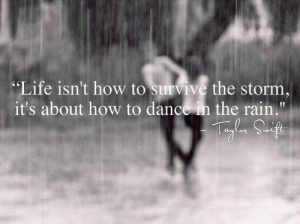My family once owned a dog that we named ThunderStorm and just called Storm. He was a chocolate Labrador from a big family and, full grown, weighed about 100 pounds. The odd thing we discovered about him, from the earliest days we had him as a puppy, was that he loved to go out and play in the rain. I don’t mean those occasionally warm spring and summer showers… I mean thunder and lightning downpours that created puddles in minutes. He delighted in going out to play in those puddles. He’d splash and frolic and bury his face in them, shake off and do it again. We hated thunderstorms. They meant someone was going to have to put on a rain coat, hat and boots to leash the dog and take him out.
 A few years later our youngest son was about seven years old and we had just enjoyed one of those warm summer showers that left puddles at the end of our driveway and in the yard. He took great delight, as children can, dancing around and jumping in those puddles. He came into the house covered in wet mud and we had to strip him down in the laundry room, but he’d had a blast.
A few years later our youngest son was about seven years old and we had just enjoyed one of those warm summer showers that left puddles at the end of our driveway and in the yard. He took great delight, as children can, dancing around and jumping in those puddles. He came into the house covered in wet mud and we had to strip him down in the laundry room, but he’d had a blast.
Have you ever stopped and wondered why children and animals can take such great delight playing in something that we adults tend to avoid? I’ve never come up with an answer beyond it being an instinctive response. Not a conscious choice of how to deal with a potentially negative situation… but a joyful response to something otherwise unenjoyable. This approach, taken by those who either can’t learn to dislike the situation or haven’t been taught to yet, can make animals and children deliriously happy at times we adults are grumpy. Maybe there’s a lesson to be learned there?
 It occurs to me that the differing reactions to rain and thunderstorms can be an analogy for how many of us manage challenges. Think about your friends and family. Some of them are simply miserable anytime the slightest thing goes wrong or is out of place. Some are able to manage small problems and maintain a positive outlook as they cope. Others seem perpetually happy no matter what goes wrong… or how badly.
It occurs to me that the differing reactions to rain and thunderstorms can be an analogy for how many of us manage challenges. Think about your friends and family. Some of them are simply miserable anytime the slightest thing goes wrong or is out of place. Some are able to manage small problems and maintain a positive outlook as they cope. Others seem perpetually happy no matter what goes wrong… or how badly.
Let’s compare those smaller problems – that some can deal with while others can’t – to the warm summer showers mentioned earlier. We all know folks who hate any small drop of rain; it makes them miserable. Others take it in stride. Some actually like it. Then there are those who seem to want to dance in the thunderstorm. Sometimes… most of the time I’d be willing to bet… those folks have stress management skills that are similar when it comes to problems or challenges in life. Some folks just can’t handle anything going wrong no matter how small. Others manage minor and medium problems okay but you can tell it’s not their forte. Then there are those folks who manage the big problems with strength and fortitude. Then… there’s this last group of people who seem to take absolute joyous delight when life seems to be swirling down the drain.
That last group? Those are the folks I want around when things go bad. When stuff goes sideways like a hurricane coming up the coast dragging tornados in its wake, I want to surround myself with people who look at the storm coming, take reasonable precautions, make necessary preparations and then? Then they have hurricane parties.
People with the best stress management and coping skills are those who like to dance in the chaos and laugh at the idea that problems can defeat them or beat them down. They simply refuse to be beaten or even to accept the concept that they can be. These are the people who have the constant positive outlook toward every situation no matter what. They recognize the negatives… they analyze the challenges… then they form a plan and enact it. But their outward appearance and behavior doesn’t seem stressed or overly worried. The true stress management masters are those who look like they’re insane dancing in the swirling debris of a hurricane, giggling while they do.
Yes… those people are the ones I want around when life goes sideways and those I strive to be like. Which are you?
